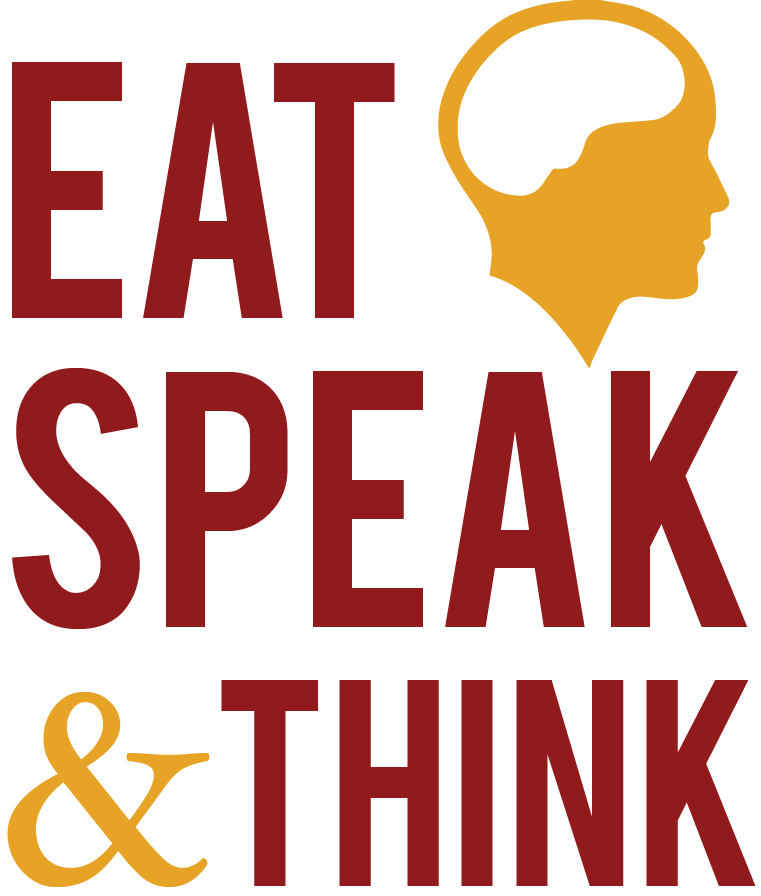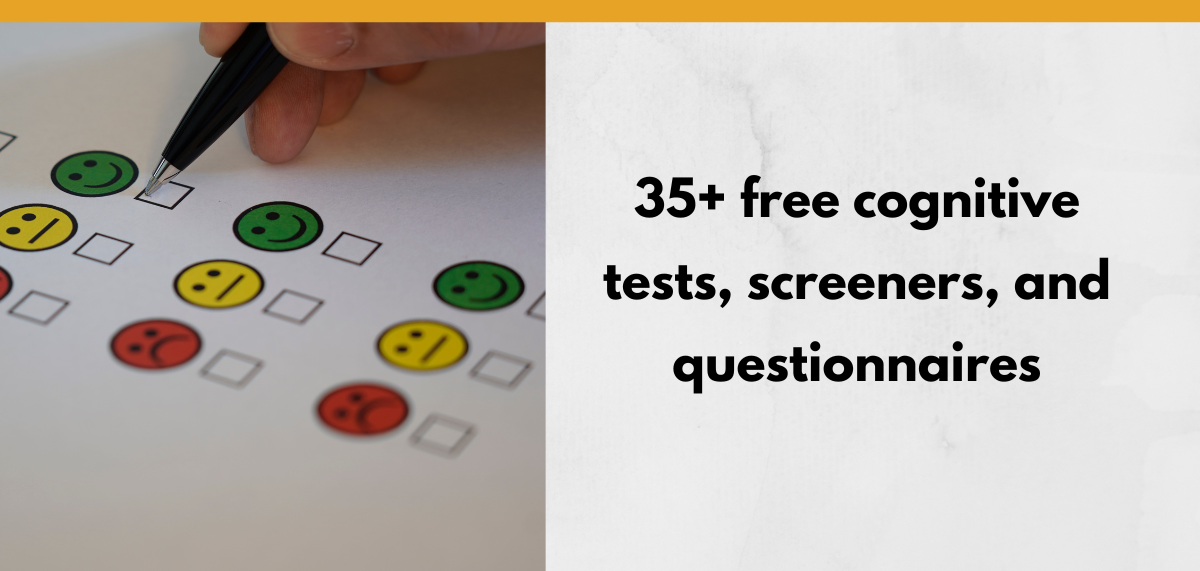Researchers have published a wide number of free cognitive tests, screeners, and questionnaires. Several years ago, I published a list of 18 free cognitive tools. The list has widely grown, thanks partly to readers of the blog who’ve shared other tools. I’ve learned about many new tools while developing my own clinical practice, including learning of several from The Informed SLP. Even this list is not comprehensive. You’ll find more in the “related posts” section. If you know of any cognitive tools not on this list, please drop a link in the comments!
Free DIRECT download: 35+ cognitive assessment tools (cheat sheet). (Email subscribers get free access to all the resources in the Free Subscription Library.)
Outline:
- Cognitive tools used by clinicians.
- Tools for patients and families.
- Condition-specific tools.
- Know of any other free cognitive tests?
- Related Eat, Speak, & Think posts.
Cognitive tools used by clinicians
We have a number of cognitive screeners and tests that we can use in our clinical practice. Check out each one to learn more about it.
Awareness Questionnaire (AQ)
The Awareness Questionnaire was designed to investigate a patient’s self-awareness after traumatic brain injury. The AQ may also be appropriate to use with a broader range of acquired brain injuries, as well. There are different versions of the form for clinicians, patients, and families.
Brief Evaluation of Executive Dysfunction
The Brief Evaluation of Executive Dysfunction can be used to examine executive function skills in older people. The target population includes people who were not thought to have cognitive impairment before hospitalization, but who have not returned to their cognitive baseline upon discharge. The test includes three instruments:
- Royall’s CLOX (clock drawing).
- The Controlled Oral Word Association Test.
- The Trail Making Test (oral version).
Cog-Log and O-Log
The Cognitive Log (Cog-Log) was designed to measure general cognitive function in hospital or rehab patients. It can be administered repeatedly, to show change (download here). It takes between 5 – 15 minutes to administer, depending on how confused a patient is.
Once a patient scores at least 15 on the Cog-Log, then the clinician can decide whether to use the Orientation Log (O-Log) as well (download here).
Functional External Memory Aid Tool (FEMAT)
The Functional External Memory Aid Tool (FEMAT) is a performance-based test that measures how well people can remember information, as well as attempts at using compensatory strategies. This test is designed to help clinicians figure out why patients are struggling with real-world tasks. You can find a tutorial in this open access paper.
Free-Cog
The Free-Cog is a short test that measures multiple cognitive domains, including executive function skills. You can find the test by searching for “free cog” from the search box on the researchers’ website or by opening the Supplementary Material in the open access paper.
Iowa Trail Making Test
The Iowa Trail Making Test (TMT) measures “visual search, scanning, speed of processing, mental flexibility, and executive functions.” There are norms for people aged 18 – 89, broken down by education level.
Medi-Cog and MedMaIDE
The Medi-Cog and the Medication Management Instrument for Deficiencies on the Elderly (MedMaIDE) are tools designed to help identify people who may have trouble independently managing their own medications.
The Medi-Cog is a 7-minute test that combines the Mini-Cog with the Medication Transfer Screen. Follow the link above to find a presentation, the blank form, and a completed example.
The MedMaIDE is a questionnaire that allows the clinician to determine how much a “person knows about their medications, if they know how to take them, and if they know how to procure their medications.” Follow the link above to find the blank form, instructions, and the reference article.
Moss Attention Rating Scale (MARS)
The Moss Attention Rating Scale (MARS) is used to help measure attention following a traumatic brain injury. Clinicians complete the rating form after at least two or three interactions with the patient (download here). You can find an excel sheet to help with scoring in the first link.
Short Orientation-Memory-Concentration Test
The Short Orientation-Memory-Concentration Test is also known as the Short Blessed Test (SBT). It’s a 6-item test that looks at orientation, short term memory, and mental manipulation. You can find various versions online, such as the one I linked to.
Saint Louis University Mental Status Exam (SLUMS)
The SLUMS is used to assess people for signs of mild cognitive impairment or dementia. The test is free to use, although the creators ask that you review the training video each year.
Tools for patients and families
People experiencing difficulty with cognition or thinking can complete tests or questionnaires that can help their medical providers. There are also a number of tools that are designed for families or loved ones.
Awareness Questionnaire
The Awareness Questionnaire (AQ) offers three different versions: a self-rating form, a family/significant other rating form, and a clinician rating form. You can learn more about the AQ in this introduction.
BCAT: Memory, Driving, and Power Mobility
The BCAT Research Center offers 3 online self-assessment tools:
- MyMemCheck.
- Driving Self-Assessment.
- Power Mobility Self-Assessment.
Community Integration Questionnaire (CIQ)
The Community Integration Questionnaire (CIQ) measures how well a person with traumatic brain injury (TBI) is integrating into daily life, including home integration, social integration, and productive activities. The CIQ can be completed the person with TBI or a proxy. Learn more about the CIQ in this introduction.
Functional Activities Questionnaire (FAQ)
The Functional Activities Questionnaire (FAQ) is designed to be used with older adults in all settings. The FAQ looks at the performance of a person’s abilities to complete various IADLs such as paying bills, shopping, by asking someone familiar with the patient to rate their performance on 10 skill areas. (Link to the PDF is at the end of the description.)
Informant Questionnaire on Cognitive Decline in the Elderly (IQCODE)
The IQCODE is a questionnaire designed to be answered by someone who has known the person in question for at least 10 years. The family member, friend, or medical professional reports whether the person has improved or worsened in 16 areas over the past 10 years.
Lawton-Brody IADL Scale
The Lawton-Brody Instrumental Activities of Daily Living Scale is designed to be used with older adults in the community or in a hospital setting. The Lawton-Brody IADL Scale establishes a baseline and documents change over time. Someone familiar with the person in question rates their performance in 8 different skill areas.
Multifactorial Memory Questionnaire (MMQ)
The Multifactorial Memory Questionnaire (MMQ) includes 3 self-rating questionnaires, including:
- How I Feel About My Memory.
- Memory Mistakes.
- Use of Memory Strategies.
Neuro-QoL Cognitive Short Form
The Neuro-QoL includes a set of questionnaires published by the National Institute on Neurological Disorders and Stroke (NINDS). The print versions are free, just use their search & view measures tool to find them. You can find the Cognitive Short Form and scoring guide here. The Cognitive Short Form invites the person to rate their own performance regarding 8 statements.
Patient Competency Rating Scale (PCRS)
The Patient Competency Rating Scales (PCRS) was designed to assess self-awareness after traumatic brain injury (TBI). There are three forms: one for the patient, one for a family member, and one for a clinician. The completed forms can then be compared to see if the patient is accurate in their self-awareness. You can learn more in this introduction.
Perceived Control Scale for Brain Injury (PCS-BI)
The Perceived Control Scale for Brain Injury (PCS-BI) was designed to measure of self-efficacy. You can learn more in this introduction.
Self-Administered Gerocognitive Exam (SAGE)
The Self-Administered Gerocognitive Exam (SAGE) is pretty thorough as a screening tool. It asks the user to perform a number of cognitive tasks, which can then be scored by a physician or other medical professional. There are four versions of the test, which is available in a number of languages.
Condition-specific questionnaires and tests
Some conditions are known to involve cognitive impairment, at least in some individuals. I’m sharing these tools in one location to make them easier to find.
Amytrophic Lateral Sclerosis (ALS)
The ALS Cognitive Behavioral Screen (ALS CBS) can be used to screen for cognitive or behavioral changes in people with ALS. You can find information and scoring and the supporting research.
The Edinburgh Cognitive and Behavioral ALS Screen (ECAS) is available in multiple languages and has also been validated for Parkinson’s disease, Progressive Supranuclear Palsy, and young onset dementia.
Dementia
The severity of dementia can be determined by using the Global Deterioration Scale (GDS), based on the Brief Cognitive Rating Scale (BCRS) and the Functional Assessment Staging (FAST) tool.
Another tool is the Dementia Severity Rating Scale, first developed by Clark & Webank (1996) and later updated by Webank et al (2009). This tool can determine severity of impairment and predict rate of decline.
The Quick Dementia Rating Scale (QDRS) includes two versions, one for patients and one for family. The QDRS asks patients and family to rate the person in question on how they have changed from how they used to be.
The final tool I’d like to mention at this time is the Rowland Universal Dementia Assessment Scale (RUDAS). The RUDAS is a short screening tool that minimizes the effects of cultural differences on cognitive assessments.
Parkinson’s disease & Huntington’s disease
The Parkinson’s Disease – Cognitive Functional Rating Scale (PD-CFRS) includes 12 questions about functional tasks. It’s currently available in seven languages.
There is a similar test called the Parkinson’s Disease – Cognitive Rating Scale (PD-CRS). The PD-CRS is designed to assess a range of cognitive functions and can be repeatedly administered over time. It’s available in a wide number of languages.
We can use the PD-CRS to test cognitive function in Huntington’s disease using the cut-off scores in this article.
Stroke
Here’s a screener designed to assess cognition in people who’ve just had a stroke: The Oxford Cognitive Screener (OCS). The UK English version is free, but you can purchase the American English version for a small fee.
Know of any other free cognitive tests?
Like I said at the top, this list has grown from 18 largely because readers of this blog were kind enough to reach out to share other tests they knew. If you know any tests, screeners, or questionnaires not on this list, please share in the comments below!
Related Eat, Speak, & Think posts
- How to assess cognitive impairment in long COVID.
- 3 versions of the Clock Drawing Test for cognition.
- How to assess pragmatic skills in adults with brain injury.
Free DIRECT download: 35+ cognitive assessment tools (cheat sheet). (Email subscribers get free access to all the resources in the Free Subscription Library.)
Featured image by iKrUeMeL from pixabay.
Lisa earned her M.A. in Speech-Language Pathology from the University of Maryland, College Park and her M.A. in Linguistics from the University of California, San Diego.
She participated in research studies with the National Institute on Deafness and other Communication Disorders (NIDCD) and the University of Maryland in the areas of aphasia, Parkinson’s Disease, epilepsy, and fluency disorders.
Lisa has been working as a medical speech-language pathologist since 2008. She has a strong passion for evidence-based assessment and therapy, having earned five ASHA Awards for Professional Participation in Continuing Education.
She launched EatSpeakThink.com in June 2018 to help other clinicians be more successful working in home health, as well as to provide strategies and resources to people living with problems eating, speaking, or thinking.



Be First to Comment